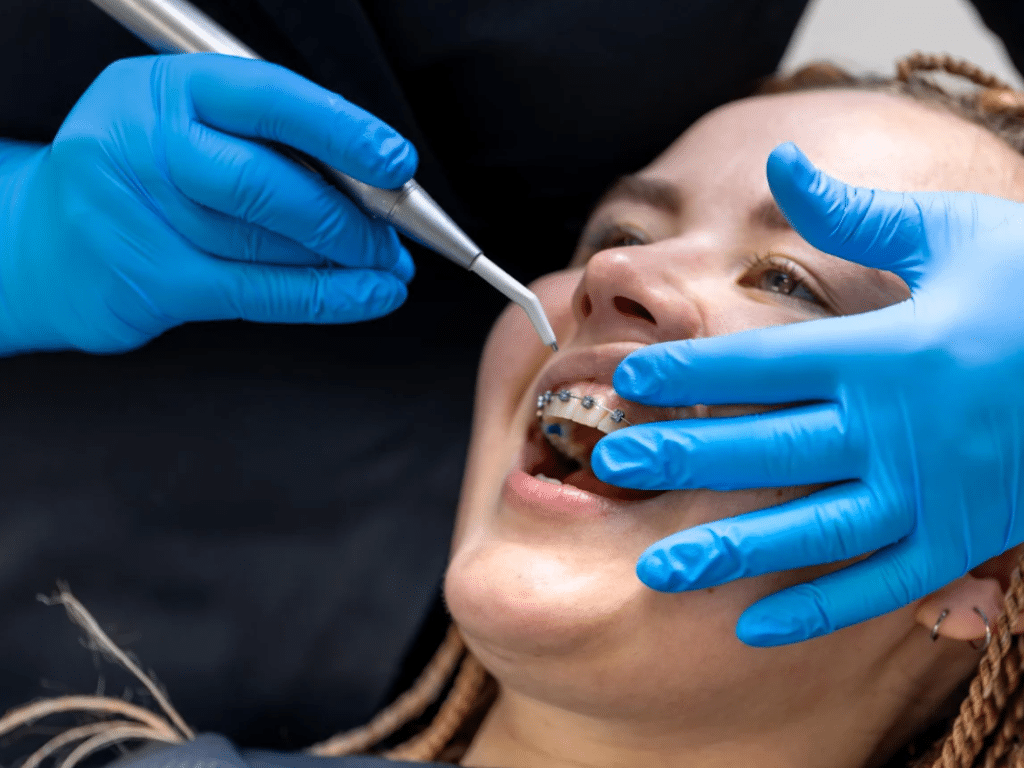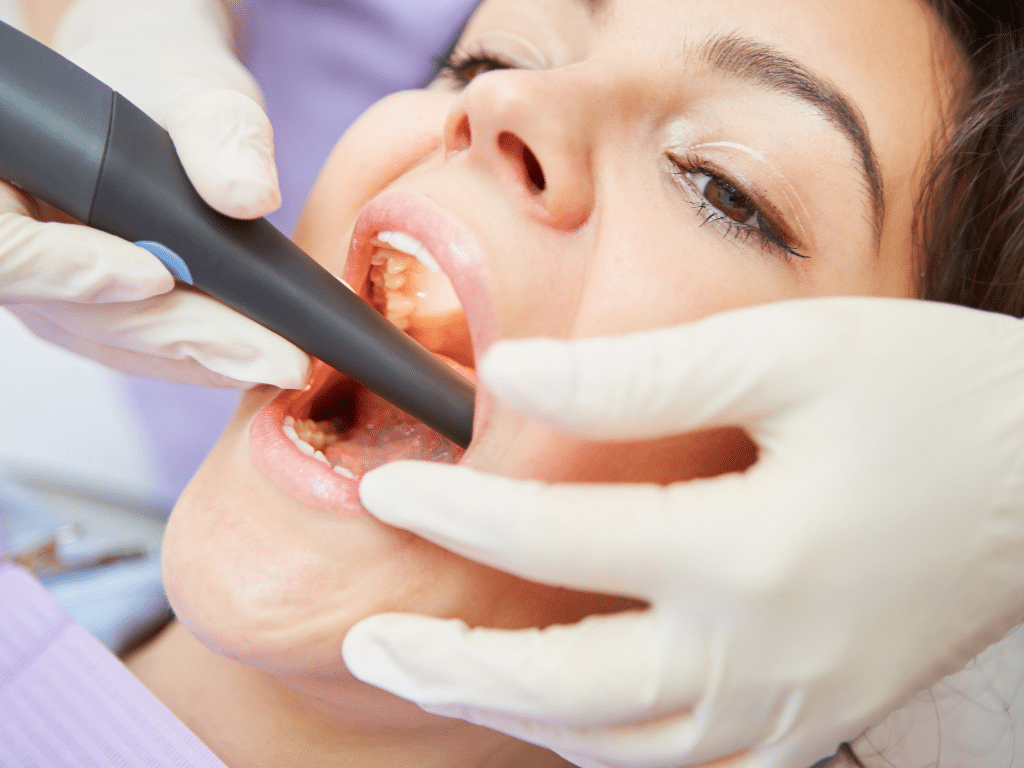Living in Hamilton, you juggle a busy life filled with work, family, and social activities. The last thing you need is a sharp pang of pain every time you sip hot coffee or enjoy a refreshing ice cream cone. Yet, for many Hamiltonians, tooth sensitivity becomes a frustrating reality. Don’t let discomfort hold you back from savoring life’s simple pleasures. Understanding the causes of tooth sensitivity and exploring available treatment options empowers you to regain a pain-free smile.
1. The Enamel Erosion Culprit
The outer layer of your tooth, enamel, acts as a shield, protecting the sensitive dentin layer underneath. However, various factors can erode enamel, leaving dentin exposed and vulnerable to hot, cold, acidic, or sweet stimuli. Common culprits include:
- Brushing too hard: Overzealous brushing with a hard-bristled toothbrush can wear down enamel over time. Use a soft-bristled brush and gentle technique.
- Acidic foods and drinks: Regularly consuming acidic beverages like soda, citrus juice, or coffee can eat away at enamel. Consider water or unsweetened tea alternatives.
- Bulimia: The repeated exposure to stomach acid from purging can severely erode enamel. Seek professional help for eating disorders.
- Medications: Certain medications can contribute to dry mouth, which weakens enamel. Discuss alternative medications with your doctor if possible.
Suggestions:
- Switch to a toothpaste formulated for sensitive teeth. Look for ingredients like potassium nitrate or stannous fluoride, which help block the dentin tubules, reducing sensitivity.
- Consider using a desensitizing mouthwash alongside your toothpaste routine.
- Avoid acidic foods and drinks, or rinse your mouth with water after consumption to neutralize acidity.
2. Receding Gums: An Exposed Problem
Healthy gums protect the tooth root, where dentin is naturally exposed. However, gum recession allows hot or cold stimuli to directly reach the dentin, causing sensitivity. Factors contributing to receding gums include:
- Poor oral hygiene: Plaque build-up at the gumline irritates gums, leading to inflammation and recession. Practice meticulous brushing and flossing.
- Hormonal changes: Pregnancy, menopause, and puberty can contribute to gum sensitivity. Discuss concerns with your dentist.
- Aggressive brushing: See point 1 for the importance of gentle brushing techniques.
- Smoking: Smoking weakens the gum tissues, increasing the risk of recession. Quitting smoking is highly beneficial for overall oral health.
Suggestions:
- Maintain excellent oral hygiene at home. Brush twice a day for two minutes each time, and floss daily.
- Schedule regular dental cleanings with your Hamilton dentist to remove plaque and tartar buildup.
- Explore scaling and root planing procedures, a deep cleaning that removes bacteria below the gumline in cases of moderate gum disease.
3. Cracked or Chipped Teeth: Painful Openings
Cracks or chips in teeth expose dentin or even the innermost pulp layer, leading to significant sensitivity. Causes can include:
- Chewing on hard objects: Biting on ice cubes, nuts, or hard candy puts undue stress on teeth.
- Trauma: A blow to the face can cause cracks or chips.
- Bruxism (teeth grinding): Unconscious teeth grinding at night puts pressure on teeth, leading to cracks.
Suggestions:
- Avoid chewing hard objects to prevent future damage.
- Wear a mouthguard at night if you suspect bruxism.
- Schedule a dental appointment to address existing cracks or chips. Depending on the severity, treatment may involve fillings, crowns, or root canals.
4. Worn-Down Teeth: A Lifetime of Exposure
Over time, teeth naturally wear down due to years of chewing. This exposes dentin and increases sensitivity. Contributing factors include:
- Age: Enamel naturally thins with age.
- Bruxism (teeth grinding): Excessive grinding wears down the chewing surfaces, exposing dentin.
- Acidic erosion: See point 1 for details on how acidic foods and drinks contribute to enamel wear.
Suggestions:
- Manage bruxism with a mouthguard as mentioned in point 3.
- Discuss dietary changes to minimize acidic intake.
- Explore dental restorations like crowns or onlays to cover worn surfaces and reduce sensitivity.
5. Recent Dental Work: A Temporary Discomfort
Fillings, crowns, and other dental procedures can sometimes cause temporary sensitivity. This usually subsides within a few weeks.
Suggestions:
- Use a desensitizing toothpaste for temporary relief.
- If sensitivity persists beyond a few weeks, contact your dentist to rule out any underlying issues.
6. Tooth Decay: A Painful Reality
Tooth decay, or cavities, can progress to the point where they expose the sensitive dentin layer. This exposure leads to pain when exposed to hot, cold, sweet, or acidic substances.
Suggestions:
- Regular dental check-ups and cleanings are essential for early detection and prevention of cavities.
- Proper oral hygiene practices, including brushing twice a day, flossing, and using fluoride toothpaste, help prevent tooth decay.
- Consider dental sealants for children and adults to protect the chewing surfaces of teeth.
7. Gum Disease: A Silent Threat
Gum disease, or periodontitis, is a serious infection that destroys the tissues supporting your teeth. As the gums recede, the root surfaces become exposed, leading to sensitivity.
Suggestions:
- Regular dental check-ups are essential for early detection and treatment of gum disease.
- Deep cleaning (scaling and root planing) may be necessary to remove tartar and bacteria below the gumline.
- Consistent oral hygiene practices, including brushing, flossing, and mouthwash, help prevent gum disease.
8. Tooth Grinding (Bruxism): Unconscious Damage
Bruxism, the habit of grinding or clenching your teeth, can wear down enamel and expose dentin, causing sensitivity.
Suggestions:
- Wear a custom-made mouthguard at night to protect your teeth from grinding.
- Stress management techniques like relaxation exercises or yoga can help reduce bruxism.
- Consult with a dentist for further evaluation and treatment options.
9. Over-the-Counter Products: Temporary Relief
Numerous over-the-counter products claim to alleviate tooth sensitivity. While some may provide temporary relief, it’s important to consult with a dentist to determine the underlying cause.
Suggestions:
- Look for toothpastes containing potassium nitrate or stannous fluoride, which can help block pain signals.
- Consider using a desensitizing mouthwash for additional relief.
- Be cautious of products with excessive amounts of fluoride, as they can cause irritation.
10. When to Seek Professional Help
If tooth sensitivity persists or worsens despite home remedies, it’s crucial to consult with a dentist. They can accurately diagnose the underlying cause and recommend appropriate treatment.
Suggestions:
- Schedule a comprehensive dental exam to identify the source of sensitivity.
- Discuss your symptoms and medical history with your dentist.
- Follow your dentist’s recommendations for treatment and preventive care.
Conclusion:
Tooth sensitivity can be a bothersome condition, but understanding its causes and available treatment options empowers you to take control of your oral health. By practicing good oral hygiene, making lifestyle adjustments, and seeking professional care when needed, you can effectively manage tooth sensitivity and enjoy a pain-free smile. Remember, prevention is key. Regular dental check-ups and early intervention are essential for maintaining optimal oral health.
Don’t let tooth sensitivity disrupt your life. Contact Nebodental Centre today for expert care and relief. Our experienced dentists in Hamilton offer a range of treatment options tailored to your specific needs.
Name: Nebo Dental Centre
Address: 260 Nebo Road, Hamilton, ON L8W 3K5
Phone: 905.381.9802
Email: [email protected]
Website: https://nebodentalcentre.com/
“Your smile, our priority.“
FAQs
-
A1: While complete elimination may not always be possible, addressing the underlying cause and following recommended treatments can significantly reduce sensitivity.




